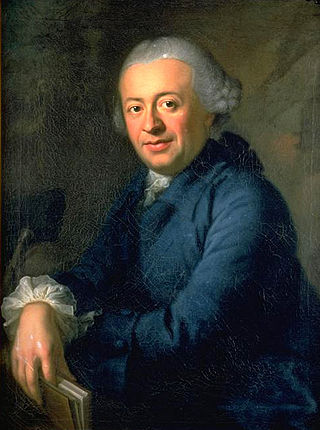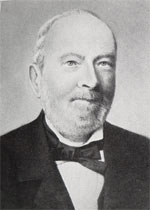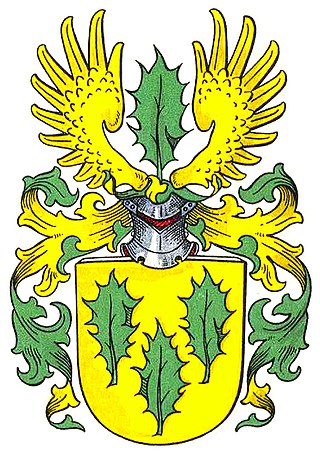
Friedrich Wilhelm Adolph Marr was a German journalist, Racial socialist and politician, who popularized the term "antisemitism" (1881).

Salomon Gessner was a Swiss painter, graphic artist, government official, newspaper publisher, and poet, best known in the latter instance for his Idylls. He was a co-founder of the Helvetic Society and the first publisher and editor of the Neue Zürcher Zeitung.

Alexander Friedrich Michael Lebrecht Nikolaus Arthur Graf von Keyserling was a Baltic German geologist and paleontologist from the Keyserlingk family of Baltic German nobility.
Norddeutscher Lloyd was a German shipping company. It was founded by Hermann Henrich Meier and Eduard Crüsemann in Bremen on 20 February 1857. It developed into one of the most important German shipping companies of the late 19th and early 20th centuries, and was instrumental in the economic development of Bremen and Bremerhaven. On 1 September 1970, the company merged with Hamburg America Line (HAPAG) to form Hapag-Lloyd AG.

Augustus William, a member of the House of Welf, was Duke of Brunswick-Lüneburg and ruling Prince of Wolfenbüttel from 1714 until his death.

August Ferdinand Howaldt was a German engineer and ship builder. The German sculptor Georg Ferdinand Howaldt was his brother.

Prince Wilhelm Friedrich Franz Joseph Christian Olaf of Prussia was the eldest child of Wilhelm, German Crown Prince, and Duchess Cecilie of Mecklenburg-Schwerin. At his birth, he was second in line to the German throne and was expected to succeed to the throne after the deaths of his grandfather, Emperor Wilhelm II, and his father, Crown Prince Wilhelm. Both, however, outlived him.

The Hanseaten is a collective term for the hierarchy group consisting of elite individuals and families of prestigious rank who constituted the ruling class of the free imperial city of Hamburg, conjointly with the equal First Families of the free imperial cities of Bremen and Lübeck. The members of these First Families were the persons in possession of hereditary grand burghership of these cities, including the mayors, the senators, joint diplomats and the senior pastors. Hanseaten refers specifically to the ruling families of Hamburg, Lübeck and Bremen, but more broadly, this group is also referred to as patricians along with similar social groups elsewhere in continental Europe.

Eduard Crasemann was a German General der Artillerie in the Wehrmacht and convicted war criminal who commanded several Panzer divisions during World War II.

Joh. Berenberg, Gossler & Co. KG, commonly known as Berenberg Bank and also branded as simply Berenberg, is a multinational full-service private and merchant bank headquartered in Hamburg, Germany. It is considered the world's oldest merchant bank.

Johann Hinrich Gossler was a German merchant and banker. He was married to Elisabeth Berenberg (1749–1822) and succeeded his father-in-law Johann Berenberg as head of the Berenberg & Gossler company, that was renamed Joh. Berenberg, Gossler & Co. the year following his death. During Gossler's tenure as the company's main partner it became one of the largest merchant houses of Hamburg. Many of his descendants were prominent in Hamburg society, including his grandson, Hamburg's first mayor Hermann Gossler. Some of his descendants were later ennobled as the barons von Berenberg-Gossler. The Gossler Islands in Antarctica are named in honour of his family.

The Berenberg family was a Flemish-origined Hanseatic family of merchants, bankers and senators in Hamburg, with branches in London, Livorno and other European cities. The family was descended from the brothers Hans and Paul Berenberg from Antwerp, who came as Protestant refugees to the city-republic of Hamburg following the Fall of Antwerp in 1585 and who established what is now Berenberg Bank in Hamburg in 1590. The Berenbergs were originally cloth merchants and became involved in merchant banking in the 17th century. Having existed continuously since 1590, Berenberg Bank is the world's oldest surviving merchant bank.

The Amsinck family is a Dutch-origined patrician family whose members were prominent merchants in multiple countries including the Netherlands, Hamburg, Portugal, England, France, Hanover, Holstein, Denmark, Suriname and India. From the 17th century the Hamburg branch of the family formed part of the city-state's ruling class, the Hanseaten or hereditary grand burghers, who enjoyed legal privileges in Hamburg until 1918. Amsinck has been one of Hamburg's great business families over many centuries, and its members reached the highest positions in Hamburg society, including as senators and head of state. A branch of the family were large plantation owners in Suriname. The Hamburg branch retained a Dutch identity for centuries, often intermarrying with other Dutch-origined patrician families.
William Brandt's Sons & Co. Ltd was an Anglo-German merchant bank and accepting house in the early nineteenth and late twentieth century.
Wilhelm Ernst Barkhoff was a German solicitor, founder of anthroposophically oriented alternative banking, the GLS Bank, reformer of the German welfare system and inspirer of the movement for Ethical banking.
The Nachrichten-Abteilung, also known as N, was the naval intelligence department of the German Imperial Admiralty Staff or Admiralstab between 1901–1919. It focused its efforts on France, the United States and above all the United Kingdom, whose Royal Navy was Germany's principal rival for naval supremacy. Although it was able to recruit a worldwide network of agents, drawing on the resources of German shipping companies and the German diplomatic service, the organisation's effectiveness was limited by rivalries within the Imperial German Navy and competition with the German Army's intelligence department. Its activities had little practical impact on the course of the First World War and it was dissolved in 1919 after Germany's defeat in the war.

Gustav Heinrich Kirchenpauer was a jurist, journalist and natural history researcher. His zoological publications are considered to be a significant contribution to knowledge of hydroids and bryozoans.

Rudolph Puggaard was a Danish merchant, patron of the arts and philanthropist.

Lutz-Georg Stavenhagen was a German politician and member of the Christian Democratic Union of Germany (CDU). He was Minister of State in the Foreign Office from 1985 to 1987 and Minister of State in the Federal Chancellery from 1987 to 1991.
Julius Johannes Wilhelm Köbner, originally Salomon Købner,, was one of the founding fathers of Northern European Baptists, along with Johann Gerhard Oncken and Gottfried Wilhelm Lehmann, known as the Baptist "cloverleaf". In addition to his extensive missionary and teaching activities in the young free church, his work as a hymnwriter and author is notable.














